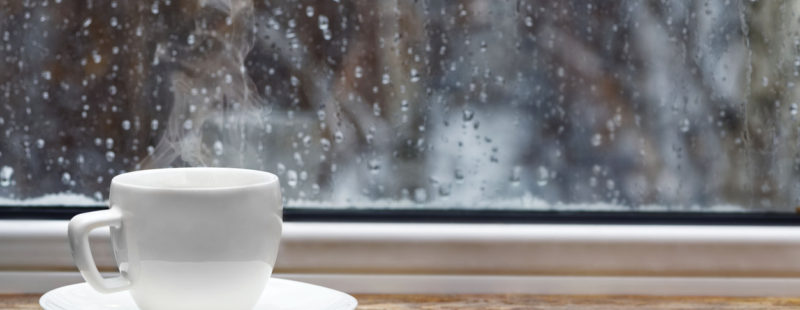The outbreak of Coronavirus (COVID-19), for many people, will mean a tough, but necessary period of social isolation. Many of us will miss family, friends, and taking part of hobbies, interests and activities. Our Campaign Manager for England, Andy Nazer, spoke to three older men about Coronavirus, and reflects on the impact it will have on their lives.
Sharing a cuppa
Another grey, drizzly day in a little place not far from the middle of nowhere, three gents in their ‘80s sit in the bakery drinking tea and eating toasted buns. They talk about Coronavirus and what it soon might mean to them. And they include me in the conversation.
It transpires they’ve met in this bakery every Thursday and Friday for the last three years. A shared background in agriculture and the experience of losing their spouses had brought them together.
Today would be the last get together for a while because of this ‘bloody virus’. Until the ‘all clear’ sounded – whenever that will be.
Two of the gents were preparing to ‘self-hibernate’, the third was reluctantly going off to his daughter’s in Lincolnshire ‘til it had all blown over.’ “Could be months,” I said. He snapped back with a grin, “It’s hard enough spending a week at Christmas at my daughter’s. Never mind months. But the reality is there’s no one local to look out for me, and I’d rather suffer my daughter than die alone at home.”
His comment instantly brought back memories of a conversation I’d had years earlier when, for the first time, someone shared with me that they had got used to the loneliness in their life. They hated it, but they’d expected it. It was part of getting old.
But the thing they truly hated and feared the most was dying alone. Since then, sadly, I’ve heard this a lot. It’s a common fear.
Fear, ageism and loneliness
Dying alone in older age becomes more likely when you’re disconnected from friends and family by life and time.
Fear often plays a huge part in later life when there is no one to share the anxieties, the increasing frailty, illness, and all those losses that come with growing older. All these can contribute to a growing vulnerability and isolation.
Bereavement and trauma, the absence of good, solid social support often hit us just as our resilience fails. Fears make their home within us to grow and entwine with anxiety and stress.
I’ve had several conversations lately with older people about the Covid-19 crisis and the word ‘fear’ reoccurs repeatedly.
By now we are all aware that older people and those with underlying health conditions are more likely to fall seriously ill and potentially die from Covid-19. One dark report, from China, suggests the virus is killing up to 15 per cent of patients over the age of 80.
Staying in touch is so important
Professor Chris Whitty, the country’s chief medical officer reassures the public that over-80s have a good chance of surviving if infected.
However, this will mean that many older people will have to self-isolate – which will increase their risk of feeling lonely, particularly if they live alone.
Dealing with isolation and loneliness is a different struggle for each of us. There is no one-size-fits-all solution, but for many people, new-shared life experiences, good news and joyful memories revived can help.
“That’s why staying in touch with older friends, relatives and neighbours over the phone, WhatsApp, FaceTime, or whatever means possible, is more important now than ever.”
The scale of the problem
Campaign to End Loneliness research found that many lonely older people simply miss company, ‘sitting with someone, and laughing with someone’. Over half of those aged over 65 live alone and one in four of us have no one at all to confide in and share our problems with.
No one.
Stop reading for a moment.
And imagine. No one.
Who have you spoken to about the Coronavirus crisis recently?
We need community
I’ve been encouraging the older people I meet to reconnect with those that are, or were, in their lives. Now’s the time to start making some phone calls. Don’t be embarrassed to renew contacts.
Families have a pivotal role in all this. Time and distance should not keep us apart and nor should coronavirus.
Neighbours need to reach out to those who are just a few footsteps away and, where possible, offer support and reassurance.
The voluntary, community and statutory sectors, together with businesses should think about how they are supporting people to maintain their connections when face-to-face engagement isn’t possible.
And the media needs to consider how it is delivering the stream of public health messages. As is often the case, language is key. Some of the language being used in the media is often casual, imprecise, clichéd and ageist.
“We each have a part to play in this. Now it’s time to show that the word Community has real meaning.”
Back in the bakery one of the old men said, “well gents, you realise this could be the last time we all meet up in here. Next stop, the crematorium. So, here’s to us… I tell you what, let’s call this the last cuppa!” He raised his cup. “I just bloody well hope the experts have got it all wrong!”





No comments on this article yet. Please feel free to submit a comment below.
By submitting a comment you grant Campaign to End Loneliness a perpetual license to reproduce your words and name/web site in attribution. Inappropriate and irrelevant comments will be removed at an admin's discretion. Your email is used for verification purposes only, it will never be shared.